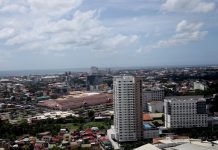A public office is a public trust. But how much trust must the citizenry impose on those who hold the reins of power, given the expanse of their authority? In the decades before the Tanodbayan, the power to discipline local officials fell on the hands of the President. This authority was exercised by using the investigative power of the justice department and the interior department. Through their recommendations, the Chief Executive suspended, reinstated or dismissed any subordinate official found to have committed offenses while in public office.
Dr. Jose P. Rizal, the national hero, once said: “I can concede that the government has no knowledge of the people, but I believe the people know less of the government. There are useless officials, evil, if you like, but there are also good ones, and these are not able to accomplish anything because they encounter an inert mass, the population that takes little part in matters that concern them.”
Ugly marks
In the pre-Commonwealth period, two Davao mayors had the misfortune of being dragged in cases that affected their political fortunes. Mayor Vicente Masecampo was dismissed “for using his office as an instrument to wreak vengeance upon his enemies, having abused his authority with the issuance of building permits, having tried by means of threats to extort P200 from a Japanese, and willfully neglecting to pay his just debts.” On the other hand, Alberto Zamora, the last American-era mayor of Davao, was suspended “for alleged defamatory statements” against Senate President Manuel L. Quezon. On February 26, 1936, on the recommendation of the Department of the Interior, Quezon, now the Commonwealth president, reinstated him.
On April 15, 1940, Quezon, by virtue of Administrative Order No. 124, dismissed “for the good of the service” Davao City councilor Donato C. Endriga on three grounds: (i) for engaging or tolerating prostitution with his alleged paramour; (ii) for confederating with his alleged paramour in the use of his house at Tomas Claudio (now Quirino) Street as gambling joint; and (iii) for receiving P300 monthly bribe from a Chinese gambling club.
But the worst hit by claims of inapt conduct was three-time Davao governor Sebastian T. Generoso. Despite his contributions to Davao’s growth, his watch was affected by unsavory events. On December 19, 1930, American Governor-General Dwight F. Davis dismissed him from office “for the good of the service” after he was charged in “certain land transactions.” He was also “actively involved in amassing lands for the Japanese [and] was known [as] a petty tyrant who used his official position for personal ends.”
Five years later, on April 12, 1935, the American governor-general reprimanded and suspended Generoso from office for a month “for various irregularities.” A year later, on June 25, 1936, Commonwealth president Manuel L. Quezon issued Administrative Order No. 14, suspending him for two months “for acts of misconduct in office.”
Quezon, in issuing Administrative Order No. 120 on February 10, 1940, suspended provincial treasurer Lorenzo Palileo “for having indirectly granted himself several loans from the funds of the Philippine National Bank [PNB] while he was Provincial Treasurer of Cotabato and Agent of the Cotabato Agency” of the same bank.
Post-war cases
From the Liberation period up to Martial Law, there were also suspensions and removals, a good number of them happening outside Davao region. Two of President Diosdado Macapagal’s disciplinary actions involved the removal of two Davao justices of the peace.
On April 3, 1962, as an offshoot of an anonymous complaint for his failure to act on time in a case, the Chief Executive issued Administrative Order No. 11, which considered Manuel I. Rivera, the justice of the peace of Caraga and Manay towns, in Davao Oriented “resigned and separated.” The President considered the delay in resolving an estafa case, which led to its dismissal, as inefficiency on the part of the official.
Two years later, Macapagal issued Administrative Order No. 82 on January 29, 1964, separating from office Orlando S. Rimando as justice of the peace of the town of Governor Generoso, Davao Oriental. The presidential fiat came about due to an administrative case filed by Catalino Sagulla, municipal mayor of Governor Generoso, against the judge “for various irregularities.”
An investigation conducted by the district judge found Rimando guilty of “taking advantage of his official position, made immoral advances to [a female inmate] detained in the municipal jail,” for failure to keep a proper record of a certain case, and for violating “the Civil Service rules and regulations by failing to file formally an application for leave of absence.”
The Tanodbayan
To highloight the constitutional right of the people to petition the government for redress of grievances and to promote higher standards of integrity and efficiency in the public service, President Ferdinand E. Marcos, on June 11, 1978, issued Presidential Decree Nos. 1486 and 1487 creating the Sandiganbayan and Tanodbayan, respectively, the forerunner of the Permanent Commission created under Article 21 of a decree issued by the Revolutionary Government of the Philippines on June 23, 1898.
There were anti-graft institutions in operation in post-war administrations. President Elpidio Quirino created an Integrity Board in 1950 followed by the Presidential Complaints and Action Commission, which President Ramon Magsaysay established in 1957. On the other hand, President Carlos Garcia formed the Presidential Committee on Administration Performance Efficiency in 1958 and Macapagal created a Presidential Anti-Graft Committee in 1962. Marcos, meanwhile, created the Presidential Agency on Reforms and Government Operations in 1966.
Congress also had its share of fighting corruption in public office. In 1969 it passed Republic Act 6028, which created the Office of the Citizen’s Counselor, mainly as a fact-finding body. To complement this, Marcos, a year later, formed the Complaints and Investigation Office, followed by the Presidential Administrative Assistance Committee in 1971.
After the collapse of Marcos leadership, the Office of the Ombudsman was created under the 1973 Constitution alongside with the Sandiganbayan, a special court. The Ombudsman is imbued with the task to “receive and investigate complaints relative to public office, including those in government-owned or controlled corporations.” In relation to this mandate, there were other issuances that came out. On July 24, 1987, President Corazon C. Aquino issued Executive Order No. 243 declaring the creation of the Office of the Ombudsman. Two years later, on November 17, 1989, Congress enacted RA 6770, the Ombudsman Act of 1989.
Duterte and others
Since the Ombudsman Act took effect, the issue of graft and corruption has not spared a handful of local leaders, mostly mayors and lawmakers, for violating RA 3019, the Anti-Graft and Corrupt Practices Act, which charges a public official who persuades, induces or influences another public officer to perform an illegal act, requests or receives any gift or similar benefit in connection with any contract or transaction the state is involved, or requests or receives pecuniary or material benefit, for himself or for another, in any manner or capacity.
Some of these celebrated cases include now President Rodrigo Duterte. On April 27, 1998, the Supreme Court (SC) dismissed the case filed against Duterte and Benjamin C. de Guzman, then mayor and city administrator of Davao City, respectively, in line with the 1990 city automation project. The high tribunal discovered that the computerization contract was rescinded on May 6, 1991, before the release of the special allotment receipt and the filing of an anti-graft case on November 12, 1991, which made the lower court’s order ineffective.
That same year, the Ombudsman cleared Davao City mayor De Guzman and two other city officials of graft cases due to the demolition of several houses. The anti-graft body sided with the accused, citing the act as legal because it was covered by a court order. In fact, conciliation proceedings were made before the demolition was done.
In 2011, the Ombudsman filed charges before the Sandigan against city vice mayor Duterte for alleged misuse of public funds in 2006 when he was still mayor. The money was intended for the city’s Special Education Program, but was diverted to a gift-giving Christmas plan. Ten other city officials were sued for technical malversation, illegal use of public funds, and graft and corruption. In the absence of negative COA findings, the case was dismissed.
That same year, the Sandiganbayan dismissed the graft case filed by House Speaker Prospero Nograles against Duterte and five public officers for demolishing a canal cover project. The project, costing P2 million, was built to prevent flooding caused by clogged garbage. The anti-graft court “saw no reason to hold the accused for trial and expose them to public accusation of the crime when no probable cause exists.”
Town mayors
On March 12, 2000, the SC dismissed the petition of then Malita, Davao Occicental, mayor Franklin P. Bautista seeking to set aside the March 13, 1998 Sandiganbayan resolution denying his motion to quash a criminal case and the same court’s October 9, 1998 denying his motion for reconsideration. The case stemmed from an anonymous letter-complaint dated November 20, 1996, charging the petitioner for causing the hiring of 192 casual employees using the peace and order fund despite the town’s meager savings.
In 2009, the Sandiganbayan found Jose Abad Santos, Davao Occidental mayor Jose Reyes Lachica guilty for purchasing a useless generator and was perpetually disqualified from holding public office. He was meted a maximum of 10 imprisonment. The case arose from the finding the mayor made the purchase without technical engineering study to determine if its features were compatible with the building’s existing electrical wirings.
Two years later, the Sandiganbayan convicted Salvador Jauod Sr., former mayor of Montevista, Compostela Valley, for buying overpriced medicines that were expired or about to expire and purchased them without bid. He was meted a penalty of 6-10 years in prison for each count of graft committed in 2003 and 2004. Under the COA rules, medicines bought should be at least two years away from their expiration dates.
In 2014, the court ordered former Baganga town mayor Gerry Morales and three department heads to indemnify the State damages and sentenced them to a 10-year jail term for ghost deliveries of auto spare parts. The COA discovered the abstract of canvass did not pass the bids and awards committee and the purchase order was not signed as to the availability of funds.
In 2015, former Caraga mayor William Duma-an was indicted by the anti-graft court for supposedly requesting and receiving monetary benefit in exchange for entering into a consultancy deal with a public market, terminal and commercial complex project. In exchange for the undertaking, he obtained a personal loan from the company, which was deposited in his bank account despite presenting a notarized contract with loan confirmation and promissory note.
That same year, mayor Ramie Rosit of Boston, Davao Oriental, and other local officials were sued for purchasing construction equipment without bid. COA said the town took a loan from PNB to purchase of a motor grader and wheel loader but did not make a bid. Instead, it resorted to direct contract without finding out first if there were sub-dealers selling the same equipment at lower prices or that suitable substitutes could be obtained at more advantageous terms.
Banner year
2016 will go down in Davao history as the year when many public officials were indicted, charged, and convicted for culpable violations by the anti-graft courts. As a result of the SC ruling declaring the Presidential Development Assistance Fund (PDAF) as unconstitutional, high-profile politicos saw their involvement in the pork barrel scam getting undesired results.
Former Davao del Sur congressman Douglas Marc IV Cagas was charged for using his P6 million PDAF to fund ghost projects in 2008. Two counts of violation of RA 3019, one count of malversation and another count for malversation through falsification of public documents were filed against him. Meanwhile, former Mayor Juan Cipriano Celso Sarenas of Pantukan, Compostela Valley was found guilty of simple misconduct for failing to divest of his business interest in a mining company and was ordered to pay a fine equivalent to two months’ salary.
Former Davao del Sur governor Benjamin Bautista, Jr. and five others were convicted for the illegal procurement of high-end vehicles in 2003. The Sandiganbayan said “the procurement… was not covered in the annual procurement program” and there was “haste in the procurement which ultimately benefited the dealers of the brands.”
The Ombudsman affirmed the indictment of former congressman Arrel Olaño of Davao del Norte for malversation of public funds and direct bribery for misappropriating his 2007 PDAF. He was also found to have received commissions and kickbacks.
Arfran Quiñones, former mayor of Lupon, Davao Oriental was charged with 10 counts of malversation of public property and a violation of RA 3019 before the Sandiganbayan. He was found to have misappropriated government properties that remained unaccounted for even after his term ended in 2007. On top of these are 44 counts of malversation of public funds through falsification of public documents that were also filed against him.
James Joyce, mayor of Jose Abad Santos, Davao Occidental was indicted before the Sandiganbayan for grave threats and slight physical injuries. The case arose from a road altercation in October 2014 in Barangay Caburan Small, Jose Abad Santos , when he inflicted bodily harm and threatened to kill a certain Brown Tan Camacho, Sr.
Former Jose Abad Santos, Davao Occidental, mayor Alex Wangkay was ordered indicted in the Sandiganbayan for violation of RA 3019 in connection with procurement irregularities in the bidding of its small water impounding project (SWIP) in 2009. The Ombudsman said he gave unwarranted benefits and advantage to the contractor without the benefit of a public bidding.
Former Baganga, Davao Oriental, mayor Gerry Morales was meted six years to 10 years imprisonment after the Sandiganbayan found him guilty of violating RA 3019. He was also perpetually disqualified from holding public office.
Early in January 2017, the Ombudsman ordered a six-month suspension without pay of former Bansalan, Davao del Sur, mayor Edwin Reyes for simple neglect of duty due to his unjustified refusal to pay the monetary claims of a former utility worker of the municipality who died in 2014 despite a Civil Service Commission ruling.
On March 7, 2017, in a statement issued by the anti-graft court, former House Speaker Nograles was facing graft and malversation charges for the alleged misuse of another lawmaker’s PDAF. The indictment involved three counts of graft, a single count of malversation, and two counts of malversation through falsification of documents.





